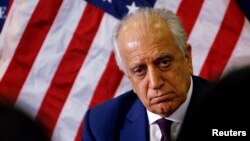Afghan-Taliban representatives met with U.S. officials Monday amid moves to press for a negotiated end to Afghanistan's 17-year war.
The Pakistan-organized talks were held in the United Arab Emirates. Officials who participated were not immediately available to discuss details.
The special representative for Afghanistan reconciliation, Zalmay Khalilzad, led the U.S. team in the talks that included envoys from Pakistan, Afghanistan, Saudi Arabia as well as the host country, Taliban and Pakistani officials told VOA.
Taliban spokesman Zabihullah Mujahid said the group's representatives spoke only to the U.S. team and had no plans to speak with anyone from Afghanistan's National Unity Government, or NUG. Taliban officials said reports to the contrary were "propaganda."
Mujahid said meetings about peace negotiations will continue on Tuesday. He asserted the “preliminary” round of discussions with Khalilzad’s team focused on withdrawal of foreign “occupation” forces from Afghanistan and ending “oppression” being inflicted by American and its allies in Afghanistan.”
US Praises Pakistan Role
When asked about the talks, a State Department spokesperson told VOA Monday that the meetings are part of U.S. efforts to promote an intra-Afghan dialogue toward ending the conflict.
"We welcome any actions the Pakistani government takes to advance security, stability and cooperation in South Asia, including the fostering of negotiations between the Taliban, the Afghan government and other Afghans, the spokesperson said.
The spokesperson also said a recent letter from U.S. President Donald Trump to Pakistani Prime Minister Imran Khan "emphasized that Pakistan’s assistance with the Afghan peace process is fundamental to building an enduring U.S.-Pakistan partnership."
Trump administration officials have hardened the U.S. position on Pakistan in recent months, suspending hundreds of millions of dollars in aid for what the officials say is Islamabad's unwillingness to act decisively against the Taliban. Pakistani authorities reject that charge, and point to the thousands of troops who have been killed fighting militants in the volatile Afghan border region.
Islamabad has long urged in talks with the U.S. that rival India’s growing influence in Afghanistan is a matter of concern for Pakistan. Security officials blame Indian intelligence operatives for supporting militants planning terrorist attacks in Pakistan from Afghan soil, charges both Kabul and New Delhi reject.
A Next Step after Moscow Meeting
The meetings in Abu Dhabi follow peace talks last month in Moscow. Those talks did not include representatives from the Afghan government.
A senior Pakistani government official, who spoke to VOA on condition of anonymity, said the Abu Dhabi round was the first time in three years that Afghan government officials and Taliban representatives both attended a peace talks meeting.
“This is a feat much more important in its impact than the Russians' initial success to bring the Taliban to table without NUG,” the official told VOA.
The official, while responding to the Taliban’s denials, said the UAE meeting was never intended to be a direct talk with the Kabul government and the Taliban at this stage. “Their presence in each other's vicinity was a CBM (confidence building measure),” he added.
In the run-up to Monday's meetings, Pakistani officials told VOA in background interviews the U.S. has directly engaged the Taliban since July to promote a political settlement to the Afghan war but said Washington still has "no clear plan" on how to further the peace process.
Roads to Peace
U.S. envoy Khalilzad is visiting regional countries to gather support for Afghan peace talks. His 18-day trip is due to end on Tuesday during which he also visited Pakistan, Afghanistan, Russia, Turkmenistan, Uzbekistan and Belgium.
Pakistani officials privy to Khalilzad’s interaction with the Taliban have told VOA that until now, no progress has been achieved because the insurgents adamantly demand “a date or timeframe” for all U.S. and NATO troops to withdraw from Afghanistan before the Taliban decide to participate in an intra-Afghan peace process.
Analysts remain skeptical on whether renewed Pakistani efforts would lead to an end of Afghan hostilities.
Previous U.S. administrations rejected offers from Pakistan to facilitate a political solution with insurgent elements, notes policy research analyst Adam Weinstein, a U.S. Marine Corps veteran who served in Afghanistan.
“Recreating this missed opportunity nearly two decades later will prove difficult,” Weinstein told VOA. He observed that Washington "still ascribes" to Pakistan the ability to greatly influence the Taliban both positively and negatively.
“While Pakistan still has the power to prolong the conflict, its ability to resolve it is diminished. Translating talks into sustainable solutions will require long-term commitment from all relevant actors, which is difficult to achieve amid ongoing military operations in Afghanistan and worsening U.S.-Pakistan ties,” Weinstein cautioned.
Washington has long maintained Taliban leaders are sheltering in Pakistan with covert support from the country’s intelligence agency. Washington has been urging Islamabad to use its influence to bring the insurgents to the negotiating table.
Pakistani officials say their influence over the Taliban has significantly declined over the years because the insurgents have gained control over large areas of Afghanistan and continue to pose serious battlefield challenges for U.S.-backed Afghan security forces.
The United States and its allies invaded Afghanistan in 2001 and the war with the Taliban has since killed nearly 150,000 people, including Afghan civilians, security forces, insurgents and more than 2,400 American soldiers, according to an American University study released recently
The longest war effort in U.S. history has also cost Washington nearly one trillion dollars. The Taliban instead has expanded its insurgent activities and currently controls or hotly contests about half of Afghanistan.
The conflict is said to have killed more Afghan civilians and security forces in 2018 than in any other year.
VOA's Nike Ching contributed to this report.




